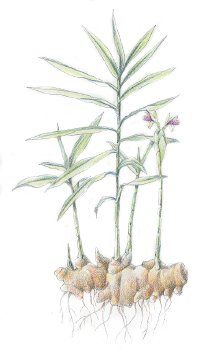This botanical and popular spice is native to southeast Asia but is readily available in the United States. Fresh ginger root is a staple in Asian cooking. Dried and powdered, it's used as an herbal remedy.
Ginger is high in volatile oils, also known as essential oils. Volatile oils are the aromatic part of the plants that lend the flavor and aroma we associate with most culinary herbs. They are called "volatile" because as unstable molecules, they are given off freely into the atmosphere. But ginger isn't just a tasty meal addition. Its root is a popular herbal remedy for easing upset stomachs, bloating and more.
Advertisement
Uses for Ginger
Ginger root is effective in reducing nausea and also may be useful in reducing the pain, stiffness, and immobility of arthritis. Dosages of approximately 3 or 4 grams of ginger powder daily appear most effective for long-standing arthritis. But powder may not be the only effective form of ginger root: One study demonstrated a response from the ingestion of lightly cooked ginger.
Ginger has also has a long history of use as an antinausea herb recommended for morning sickness, motion sickness, and nausea that accompanies gastroenteritis (more commonly called stomach flu). As a stomach-calming agent, ginger also reduces gas, bloating, and indigestion, and aids in the body's use and absorption of other nutrients and medicines. It is also a valuable deterrent to intestinal worms, particularly roundworms.
Ginger may even improve some cases of constant severe dizziness and vertigo. It may also be useful for some migraine headaches. Ginger also prevents platelets from clumping together in the bloodstream. This serves to thin the blood and reduce your risk of atherosclerosis and blood clots.
A warming herb, ginger can promote perspiration when ingested in large amounts. It stimulates circulation, particularly in the abdominal and pelvic regions, and occasionally can promote menstrual flow. If you are often cold, you can use warm ginger to help raise your body temperature. When used topically, ginger stimulates circulation in the skin, and the volatile oils travel into underlying tissues.
Try ginger root poultices on the chest for lung congestion or on the abdomen for gas and nausea. Powdered ginger and essential oils are the strongest form of ginger for topical use.
In the next section, you will learn how to prepare ginger for herbal remedies and some of the potentially dangerous side effects.
To learn more about treating common medical conditions at home, try the following links:
- For an overview of all of our herbal remedies, go to the main Herbal Remedies page.
- To learn more about treating medical conditions at home, visit our main Home Remedies page.
- One of the best things you can do for your health and well being is to make sure you are getting enough of the vital nutrients your body needs. Visit our Vitamins page to learn more.
This information is solely for informational purposes. IT IS NOT INTENDED TO PROVIDE MEDICAL ADVICE. Neither the Editors of Consumer Guide (R), Publications International, Ltd., the author nor publisher take responsibility for any possible consequences from any treatment, procedure, exercise, dietary modification, action or application of medication which results from reading or following the information contained in this information. The publication of this information does not constitute the practice of medicine, and this information does not replace the advice of your physician or other health care provider. Before undertaking any course of treatment, the reader must seek the advice of their physician or other health care provider.Before engaging in any complementary medical technique, including the use of natural or herbal remedies, you should be aware that many of these techniques have not been evaluated in scientific studies. Use of these remedies in connection with over the counter or prescription medications can cause severe adverse reactions. Often, only limited information is available about their safety and effectiveness. Each state and each discipline has its own rules about whether practitioners are required to be professionally licensed. If you plan to visit a practitioner, it is recommended that you choose one who is licensed by a recognized national organization and who abides by the organization's standards. It is always best to speak with your primary health care provider before starting any new therapeutic technique.
Advertisement
